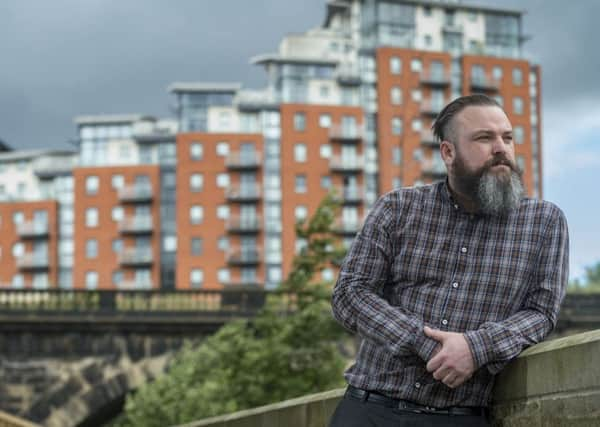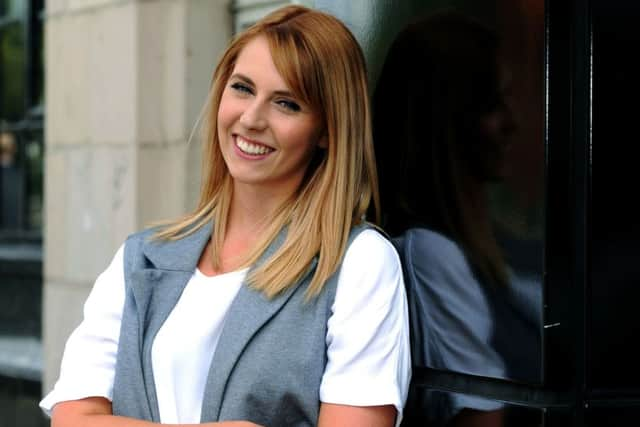Meet '˜generation rent' - the would-be homeowners


TIM Spencer has a good job, earns a decent salary and is careful with his money.
Twenty years ago he would not have had a problem getting on the property ladder. But today the 38-year-old is part of a growing generation of young professionals for whom the prospect of owning their own home, like their parents and grandparents before them, is little more than wishful thinking.
Advertisement
Hide AdAdvertisement
Hide AdIt’s a similar story up and down the country where hard working young people face the prospect of being perpetual private tenants. For them the idea of home ownership is fast becoming a luxury they simply can’t afford.


Tim works in Leeds as a credit controller for a major energy firm and lives with his partner Rebecca, a beauty therapist. They have a combined annual income of around £40,000, but he says at the moment they aren’t even close to being able to afford to buy their own home.
“I’m creditworthy, I’ve got a good job and I’m earning above the average income. But to get a mortgage we need a 15 or 20 per cent deposit which for us would be about £34,000 and we just don’t have those kind of savings stashed away.”
Tim, who comes from New Zealand originally, has lived in the UK for the past 11 years and now rents a house in Normanton, in West Yorkshire. “It’s a lovely three-storey townhouse in a nice area. We’d love to own it but we can’t afford something like this.”
Advertisement
Hide AdAdvertisement
Hide AdIt’s a situation that many people in their 20s and 30s will recognise all too well, one that reflects the findings of a report published by the Resolution Foundation last week showing a sharp drop in home ownership in big cities like Leeds, Sheffield and Manchester.


It has led to fears that cities in the North of England are facing a housing crisis akin to that seen in London.
For people like Tim there is also the added frustration of knowing they could be paying less each month if they owned their own property. “We pay £700 a month in rent when it would cost about £450 a month if we had a mortgage,” he says.
“We try and have a rainy day fund and an emergency fund but after paying the rent, bills and running a household and a car there’s not much left over each month for savings.”
Advertisement
Hide AdAdvertisement
Hide AdHe says that even if they managed to save £500 a month it would still take more than six years to raise the kind of money they need.
“Most of my friends are in the same boat. It seems like the only way you can get on the property ladder these days is if you have some kind of windfall, or you have an impeccable savings plan.”
Tim would like to see more help for first time buyers through the introduction of special mortgage deposit loans or something similar. “I’m part of that generation that went straight to work from school and me and Rebecca have both worked hard all our lives.
“We don’t live extravagantly. We don’t go out much at weekends and we live within our means. We would both love to own our own house together but it’s just not an option for us.”
Advertisement
Hide AdAdvertisement
Hide AdFor others, like 23-year-old Sheffield University graduate Gabi Binnie, the situation is a little brighter. After finishing her studies she worked as a student officer before taking up an internship at a specialist graduate recruitment and management consultancy firm based in the city.
She and her partner Izaak, a car salesman, are looking to buy their first house. “We looked around the whole region. We looked at Sheffield, Dronfield and Chesterfield and one of the main reasons we chose Chesterfield is because it’s cheaper for a similar kind of house in a nice area than Sheffield.”
The couple are hoping to buy a three-bedroom house but Gabi says it’s only thanks to financial help from her family that they can even think about being homeowners.
“If it was me on my own it would be impossible. I couldn’t get a mortgage on my salary and Izaak wouldn’t be able to buy a property on his own because of the deposit,” she says. “My dad retired recently and he offered to give us some money and that’s the only reason we could afford it.”
Advertisement
Hide AdAdvertisement
Hide AdWith her parents’ help on top of their own savings the couple have enough money to put down a 10 per cent deposit on a house.
“I paid my own way through university. I had to take out loans and I did waitress and bar work as well as bits and pieces at the university. I didn’t have to rely on the bank of mum and dad and I’m proud of that. But I’ve had to take my parents’ money, which I’m really grateful for, because without it we wouldn’t be able to buy our own house.”
The days when people could get 100 per cent mortgages are a thing of the past and, like Tim, Gabi says finding the money needed for a deposit is one of the biggest difficulties for those looking to buy their first house.
“For the past year we’ve been living with Izaak’s dad. We pay board which is less than if we were renting somewhere ourselves but even with this we’ve only been able to save about four grand. Out of my friends I’m the only one who’s even close to buying their own property. But I’m very fortunate that my parents have been able to help, most people aren’t in that position.”
Advertisement
Hide AdAdvertisement
Hide AdGabi would like to see more guidance for they young about how much money they need to buy a house in the first place. “I think if they knew from the outset they would need £10,000 they would start saving earlier,” she says.
“Students go to university and come out thinking they will get a good salary but then find that graduate jobs aren’t as highly paid as they anticipated. Quite often they have to move to London, Manchester or Edinburgh where it’s even more difficult to get on the property ladder.”
Home ownership in England reached a peak in 2003 and one of the reasons being blamed on the falling numbers is the fact that house prices have become detached from people’s earnings over the past 30 years. This, along with the fact that the flow of easy credit has been switched off in the wake of the financial crash six years ago, has dramatically changed the landscape.
For Gabi and Izaak, though, there is hope that they could soon have their own home. They have put an offer in on a house and are now waiting to hear back. “It’s under the asking price because that’s at the top of our limit, so we’ll just have to wait and see.”
Advertisement
Hide AdAdvertisement
Hide AdAs well as taking on a mortgage Gabi also has the small matter of her student loans, which amount to around £45,000. “It’s a bit nerve-wracking but I try not to think about it too much and just concentrate on working hard.”
But while she is in a fortunate position, she feels that her generation as a whole have been dealt a rough deal. “I think what’s happening is going to hit the less well off young people the hardest and the danger is we’re going to end up with a lot of disillusioned young people, particularly students, and it really shouldn’t be like this.”
The decline of home ownership
A recent report by the Resolution Foundation think tank showed that home ownership in England has fallen to levels last seen in 1986. Thirty years ago the average house price in England was £38,000, compared with around £226,000 today.
The new report shows that in South Yorkshire, home ownership stood at just 58.4 per cent, a 9.8 per cent drop on its peak over the last decade, when it stood at 68 per cent in October 2005.
Advertisement
Hide AdAdvertisement
Hide AdWest Yorkshire saw a drop of just over 10 per cent from its April 2003 peak of 70 per cent to just 60 per cent.
The figures for the rest of Yorkshire and the Humber showed ownership levels of just 65 per cent in February, slightly above the English average of 63.8 per cent.